How are gratitude and fitness correlated?
Attitude of Gratitude
Yes, being grateful will improve your workout. Here is why:
Gratitude, joy, and happiness are closely related concepts that have been studied by researchers in the field of positive psychology. While all three are associated with positive emotions, there are subtle differences in their meanings and the ways in which they impact physical health.

What is gratitude?
Gratitude is the feeling of appreciation or thankfulness for something or someone. It is the recognition of the good things in one's life and the realization that these things come from external sources. Studies have shown that gratitude is associated with improved psychological well-being, including increased life satisfaction and decreased depression and anxiety. Additionally, research has found that gratitude is associated with improved physical health. For example, a study published in the journal Personality and Individual Differences found that gratitude is positively associated with heart rate variability, a measure of cardiovascular health. Other research has found that gratitude is associated with better sleep and improved immune function.
Is joy is the spice of life?
Joy is a feeling of delight or pleasure, often associated with positive experiences or accomplishments. Joy is typically considered to be a more intense and fleeting emotion than gratitude. Studies have found that joy is associated with increased positive affect and improved psychological well-being. Additionally, research has suggested that joy is associated with improved physical health, including decreased inflammation and improved cardiovascular health.
Does happiness affect your fitness?
Happiness is a broad term that is often used to describe a general sense of well-being or contentment. Unlike gratitude and joy, happiness is not necessarily tied to a specific event or experience. Studies have found that happiness is associated with improved psychological well-being, including increased life satisfaction and decreased depression and anxiety. Additionally, research has suggested that happiness is associated with improved physical health, including decreased inflammation and improved cardiovascular health.
How is physical health related to one’s attitude?
Physical health and fitness are closely related to one's mental attitude. Positive mental attitude (PMA) can help encourage good workouts and athletic performance. Studies have shown that athletes who have a positive mental attitude tend to perform better than those who have a negative one. For example, a study published in the Journal of Sport Psychology found that athletes who had a positive mental attitude were more likely to report higher levels of self-confidence, which in turn was associated with better athletic performance.
How can gratitude help my athletic performance?
Athletes can benefit from practicing gratitude, joy, and happiness, as these positive emotions can help improve their mental attitude and thus their athletic performance. For example, a study published in the Journal of Applied Sport Psychology found that athletes who regularly engaged in gratitude exercises reported higher levels of satisfaction with their athletic performance and their lives overall. Additionally, research has suggested that athletes who are able to maintain a positive mental attitude are better able to cope with the stress and demands of their sport.
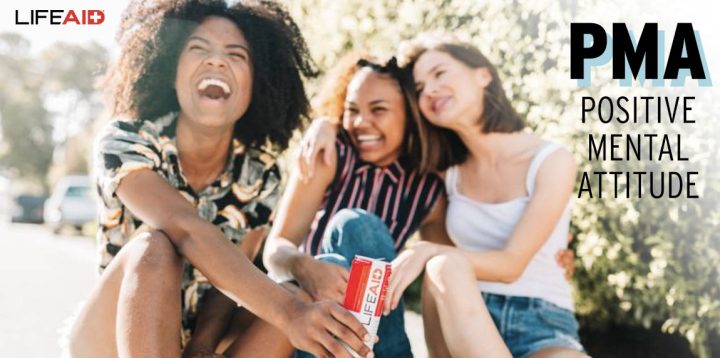
References:
-
- Emmons, R. A., & McCullough, M. E. (2003). Counting blessings versus burdens: an experimental investigation of gratitude and subjective well-being in daily life. Journal of personality and social psychology, 84(2), 377.
- Wood, A. M., Joseph, S., & Linley, P. A. (2008). The role of gratitude in the development of social support, stress, and depression: two longitudinal studies. Journal of research in personality, 42(4), 854-871.
- Algoe, S. B., Haidt, J., & Gable, S. L. (2008). Beyond reciprocity: gratitude and relationships in everyday life. Emotion, 8(3), 425.
- Emmons, R. A. (2007). Thanks! How the new science of gratitude can make you happier. Houghton Mifflin Harcourt.
- Wood, A. M., Froh, J. J., & Geraghty, A. W. (2010). Gratitude and well-being: a review and theoretical integration. Clinical psychology review, 30(7), 890-905.
- Froh, J. J., Yurkewicz, C., & Kashdan, T. B. (2009). Gratitude and well-being: a review and theoretical integration. Clinical psychology review, 29(3), 72-90.
- Froh, J. J., Sefick, D. J., & Emmons, R. A. (2008). Counting blessings in early adolescents: an experimental study of gratitude and subjective well-being. Journal of School Psychology, 46(2), 213-233.
- Wood, A. M., Maltby, J., Gillett, R., Linley, P. A., & Joseph, S. (2008). The authentic personality: a theoretical and empirical conceptualization and the development of the Authenticity Scale. Journal of counseling psychology, 55(3), 385.
- Seligman, M. E., Steen, T. A., Park, N., & Peterson, C. (2005). Positive psychology progress: empirical validation of interventions. American psychologist, 60(5), 410.
- Gable, S. L., Reis, H. T., Impett, E. A., & Asher, E. R. (2004). What do you do when things go right? The intrapersonal and interpersonal benefits of sharing positive events. Journal of personality and social psychology, 87(2), 228.
SUMMARY:
In conclusion, gratitude, joy, and happiness are closely related concepts that have been linked to improved psychological well-being and physical health. These positive emotions can be cultivated through simple practices, such as keeping a gratitude journal or engaging in activities that bring joy and happiness. Additionally, athletes can benefit from practicing gratitude, joy, and happiness, as these positive emotions can help improve their mental attitude and thus their athletic performance. Overall, it is important to be mindful of the many ways in which positive emotions can improve our overall well-being, both physically and mentally.
Amidst the current COVID-19 crisis, it is our health care heroes who have helped sustain us, the brave women and men who are tirelessly battling on the front lines of this pandemic with smiles under their masked faces. To each and every one of you, for your sacrifice and your bravery, we say THANK YOU.
This month, LIFEAID has donated over 30 pallets of FITAID ZERO to more than 150 hospitals worldwide to help fuel the dedicated paramedics, nurses and doctors on their rounds. Here are just a few of the many heroes who wear masks. We could not get through this time without you!

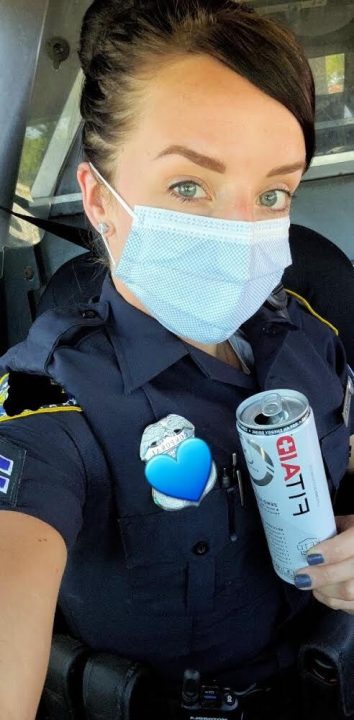 WPB Medical Center in Virginia
WPB Medical Center in Virginia
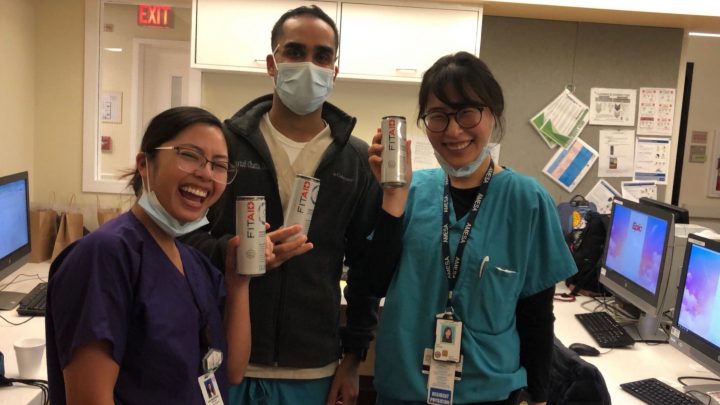
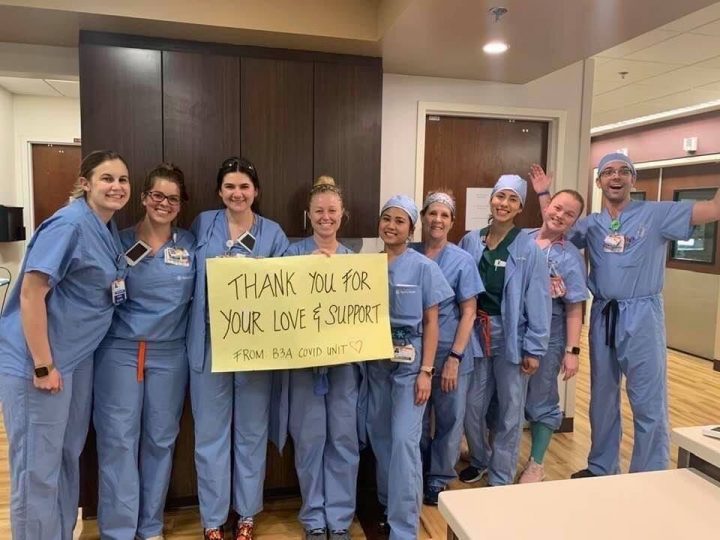 Loma Linda University Medical Center in California
Loma Linda University Medical Center in California
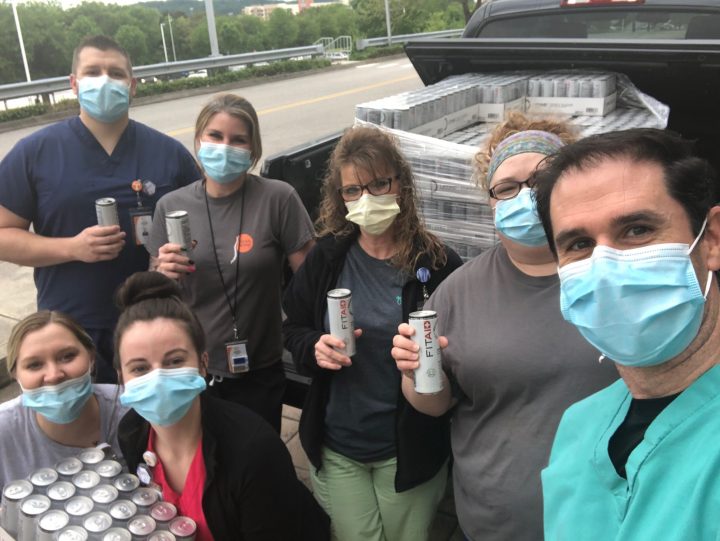 Covenant/Fort Sanders Regional Hospital in Tennessee
Covenant/Fort Sanders Regional Hospital in Tennessee
 Columbia Memorial Health in New York
Columbia Memorial Health in New York
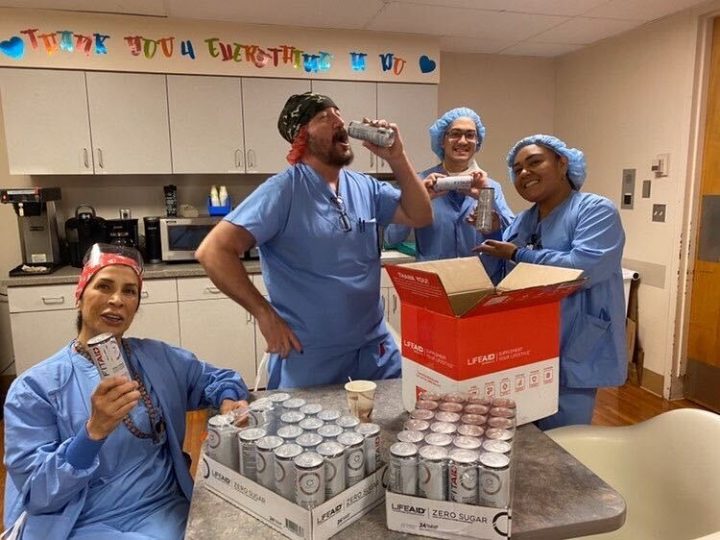 Scripps Memorial Hospital La Jolla in California
Scripps Memorial Hospital La Jolla in California
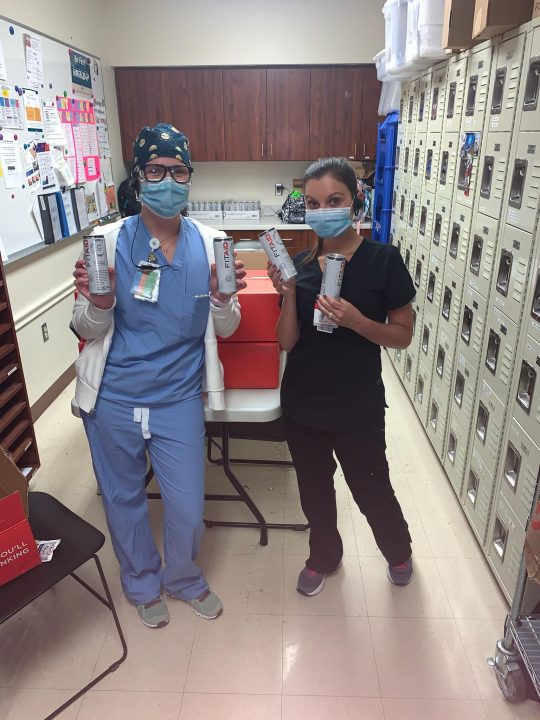 Trident Hospital in South Carolina
Trident Hospital in South Carolina
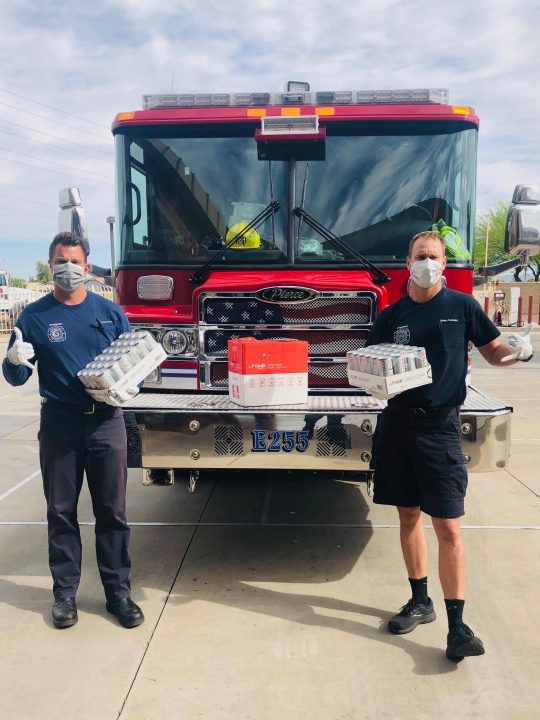
 Gilbert Fire Department in Arizona
Gilbert Fire Department in Arizona
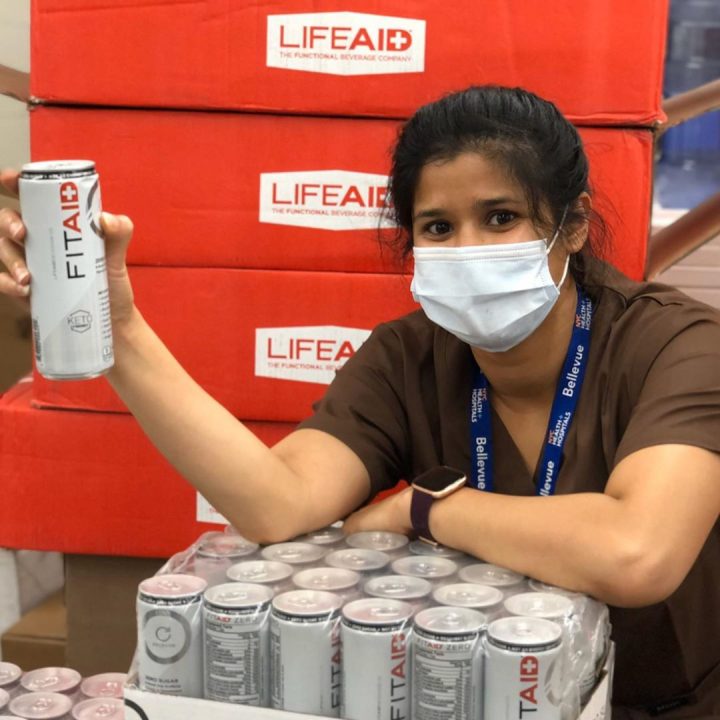 Bellevue Pharmacy in New York
Bellevue Pharmacy in New York
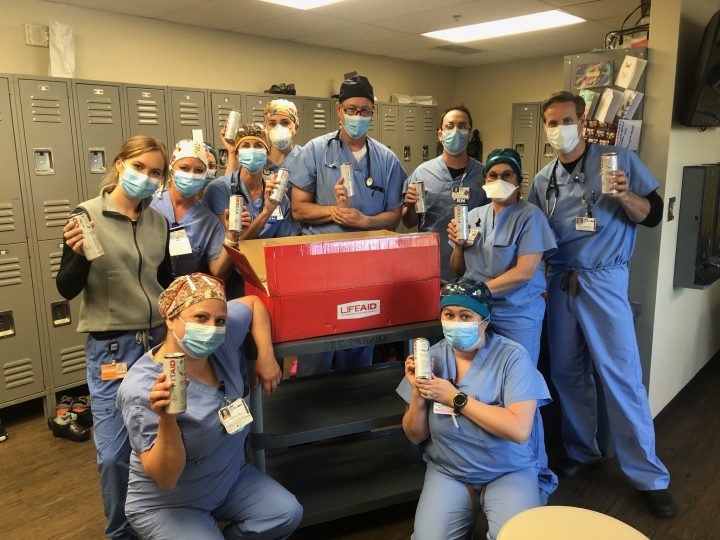 St. Luke’s Health System in Wisconsin
St. Luke’s Health System in Wisconsin
THANK YOU TO ALL OF OUR HEALTH CARE HEROES!
> > > Stay well.
The universal language of music has been used in almost every culture for centuries to stir emotions, transmit stories and connect with others. While its healing powers are renown around the globe, what can music actually do for your well-being?
Here are 3 powerful health benefits of music along with a handful of fresh playlists created by our LIFEAID crew & FITAID athletes to help you vibrate higher and rule the day!
1. MUSIC ENHANCES ATHLETIC PERFORMANCE
FACT: Some studies suggest that music can increase overall exercise performance by boosting physical and mental stimulation.
Here are some of our favorite athletes' playlists to help you crush your next workout.
Alex Michael Turner, bodybuilder: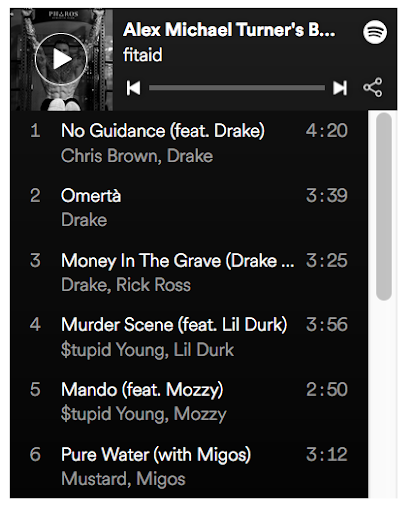 Jacob Heppner, 4x CrossFit Games athlete :
Jacob Heppner, 4x CrossFit Games athlete :

Reneé Pickett, Strong Nation master trainer: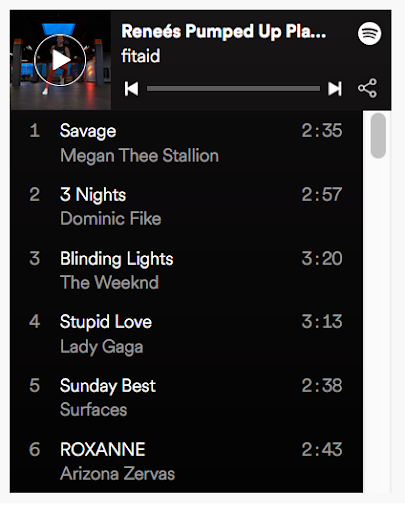
2. MUSIC IMPROVES COGNITIVE FUNCTION
FACT: Research has shown that listening to certain types of music — ones with repetitive elements in rhythm and melody — help warm up the brain, increase cognitive function and boost memory.
Here are a few playlists that our LIFEAID employees use to help them get in the zone while working.
Tamar, national events manager at LIFEAID:
Theza, director of operations at LIFEAID: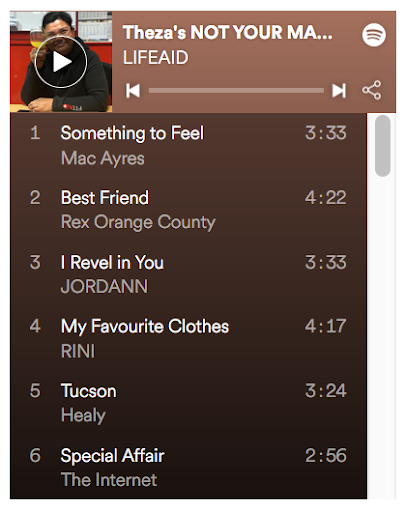 Cari, PR manager at LIFEAID:
Cari, PR manager at LIFEAID: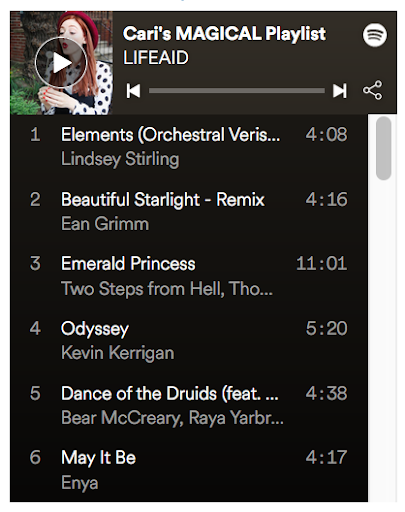
3. MUSIC IS A MOOD BOOSTER
FACT. Studies have shown that whenever you listen to music, your brain releases dopamine, the 'feel good' hormone. Music has the power to influence a listener’s emotions and—according to some researchers—can even improve one’s overall well-being, reduce stress and anxiety, and create feelings of happiness.
Enjoy the following playlists to help curate good vibes and bring joy to your daily life.
Ashley Kidd, pro wake surfer: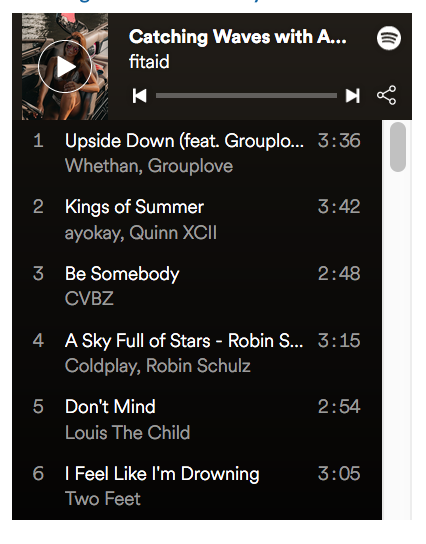
Greg, logistics coordinator at LIFEAID:

Ana, national marketing manager at LIFEAID:
BONUS: Here are two epic DJ sets from our very own LIFEAID co-founders Orion Melehan and Aaron Hinde to help pump you up during quarantine!
LIFEAID CEO Orion Melehan on SoundCloud:
LIFEAID president Aaron Hinde on SoundCloud:
To listen to more of these kinds of playlists, please visit our FITAID and LIFEAID channels on Spotify.
Music heals. Stay well and keep dancing out there, everyone!
> > > Stay well.
While this has been a time of uncertainty around the world, one thing is certain: social distancing is leading many of us to a revolutionary time as a society, we're witnessing a 'closening' of relationships. People are reflecting on what matters most in their lives, surrounding themselves with the people they love (even if only via FaceTime), appreciating nature, embracing new hobbies, making time for healthy habits, and just taking life at a slower pace in general. The LIFEAID team shares how they are practicing social distancing and embracing all the good things that have come out of this otherwise difficult time.
Wishing everyone health & calm.
—Your LIFEAID family
Aaron (President & co-founder)
- How do you start your day at home?
Keeping the same morning ritual I always have to start my day on the right trajectory has been key: 20 minutes of yoga, my 5-minute journal, Wim Hof breathing, cold shower, Keto coffee, short prayer, 5 minutes of meditation, then off to the virtual office.
. - What does your home fitness routine look like?
Morning yoga and a lot of bodyweight exercises like burpees, air squats and push-ups.
.
- What are some staples in your daily nutrition?
I drink lots of IMMUNITYAID, take extra Vitamin C and D daily, and eat clean proteins and veggies.
.
- How do you de-stress?
I take time to de-stress by taking walks, breathing, practicing yoga, meditation and grounding.
.
- What in your home helps bring you calm?
Going out on my deck, looking out over the woods towards the ocean.
.
- What keeps you motivated?
I’ve always been self motivated so don’t need anything extra to stay that way.
.
- How do you stay focused with distractions at home?
FOCUSAID and making sure I get through my top priority every day.
.
- What activities are you enjoying most during this time?
I honestly love taking walks with the family and discussing current events with my kids.
. - What new hobbies have you started or rekindled a passion for?
Orion has taught me how to DJ so I've been enjoying mixing tracks together. - What's your favorite part of this experience so far?
Social Distancing = Familial Closening
 Aaron & his family
Aaron & his family
Destiny (Email marketing)
- How do you start your day at home?
I wake up a little later (hooray for sleep!), make coffee, open up the windows and start my day.
. - What does your home fitness routine look like?
I have two small dumbbells and my body weight which is all I need! Stretch, do a few circuits of simple exercises (sit-ups, push-ups, squats & burpees) and I’m feeling good.
.
- What are some staples in your daily nutrition?
I love snacking on fruits, veggies, whole grains and IMMUNITYAID.
.
- How do you de-stress?
Stepping out onto my porch and taking a few deep breathes helps me de-stress ... I turn on some music and forget the world for a minute.
.
- What in your home helps bring you calm?
I keep all the lights off in the house and allow only natural lighting in during the day. Something about it is really calming. I also try and keep my space as tidy as possible. A clean house + sunlight coming through the windows = bliss.
.
- What keeps you motivated?
Keeping in contact with my LIFEAID family helps. A little midday impromptu dance party never hurts either!
.
- What book(s) are you reading right now?
Just grabbed a copy of Call Me By Your Name from the bookstore.
.
- What’s your favorite part of this experience so far?
The opportunity to grow as a human being and to be able to really evaluate what’s important to me at the end of the day: my health, my people and humanity.
Sabine (Accounting)
- How do you start your day at home?
I take my dog for a walk down to the beach and check the waves/surf.
.
- What does your home fitness routine look like?
I have a small home gym that is taking the temporary place of the FITAID gym at HQ right now. I also use 'Ready State,' an online mobility app, every evening. I still get out in the ocean for my paddle & surf sessions; I have a coach for my racing and we intend to stick to my training plan (even if all the races are cancelled). Sticking to the plan will give me some sense of structure and 'normalcy.'
.
-
What are some staples in your daily nutrition?
My husband and I are doing the 800 gram challenge and plan to keep doing it through this. Fortunately, my Community Supported Agriculture (CSA) is still running. I fill in the gaps with items from the Farmer’s Market. My pantry is stocked with IMMUNITYAID and FOCUSAID right now. I do rely on protein powder and bars, too, and am happy there is still plenty of that in the stores right now.
.
-
How do you de-stress?
I walk the dog, tend to my little garden, dance or skate around the kitchen, and look at TikTok.
.
- What keeps you motivated?
Living in Santa Cruz is motivating. I also love my job, so it's easy to stay motivated to do my work.
.
- What is in your home helps bring you calm?
I work by a window where I can see out to our busy street. Watching neighbors and others walk by the house calms me. We are also trying to keep the house tidy. (We already aren't doing a great job of that.)
.
- What activities are you enjoying most during this time?
I get to have lunch with my husband and take the dog for a walk. Really loving that.
Hannah (Graphic design)
- How do you start your day at home?
I try to set an alarm every morning and begin each day with some yoga. It helps me wake up and get into 'productive' mode. Practicing yoga puts my mind in a great place, allowing me to stay positive throughout the day.
.
- What does your home fitness routine look like?
After I start my day with yoga, I try to do a short circuit workout (at least 10 minutes) around lunch time to get my blood moving. I’ve really enjoyed doing AMRAPs with bodyweight exercises such as squats, burpees, sit-ups, push-ups and lunges. I also invested in some sliders, resistance bands, a kettlebell, and a pair of dumbbells (which are on the way) so I can add some weight to the mix.
. - What are some staples in your daily nutrition?
Lots of eggs, greens (spinach, kale, arugula), bananas, oatmeal, frozen vegetables (they keep much longer), nuts (great for snacking/topping salads) and ground turkey (which I can use in just about anything).
.
- How do you de-stress?
Breathe, drink tea and put on a good playlist.
.
- What keeps you motivated?
Lists!
.
- What in your home helps bring you calm?
It’s not something in my space, but rather it's getting up and taking a lap around my house every 30 minutes or so, to help keep my productivity up and help me re-focus.
.
- What activities are you enjoying most during this time?
- Playing Farkle and board games. (If you don’t know what Farkle is, look it up. It’s a lot of fun.)
- Also, cooking with my sister and her girlfriend. I haven’t spent this much time at home with my family in a long time, and we’re growing much closer and our relationships are getting much stronger.
.
- What books are you reading right now?
- I Am Malala by Malala Yousafzai
- Big Magic By Elizabeth Gilbert
. - What’s your favorite part of this experience so far?
- Being able to get creative with my workouts. I’ve always relied on the gym for exercise (I never realized just how much I relied on it until now). This time has allowed me to re-discover my love of running, hiking, yoga and volleyball.
- I’ve been spending quality time with my sister. We were never that close before, so I’m extremely thankful for this time with her.
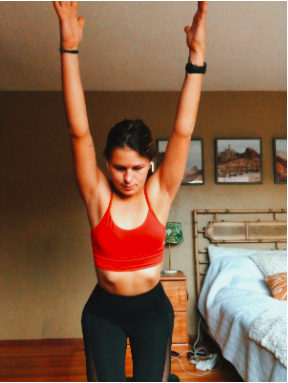 Hannah, practicing yoga at home
Hannah, practicing yoga at home
Karis (Field marketing & social media)
- How do you start your day at home?
Once the alarm goes off, I lay in bed for 15 minutes with my pups, then I get up and stretch, make myself some tea and set up my area so I'm ready to tackle work.
- What does your home fitness routine look like?
With my gym closing I’ve been able to do daily strength training workouts with the weights and resistance bands at home. I’ve been able to get my cardio and steps in by walking my dogs. I like to walk them on my lunch time so I can also get some fresh air—it gives me the chance to tackle the rest of my work day with a fresh mind.
. - How do you de-stress?
At home, I'm able to de-stress by going outside for some fresh air or listening to music.
. - What keeps you motivated?
Setting small daily goals so that I can accomplish bigger goals.
. - What activities are you enjoying most during this time?
I’ve been able to spend more time with my dogs, giving them lots of extra cuddles. Also, in our home we’re enjoying classic board games as a family.
 Karis & fur friends
Karis & fur friends
Claudia (Operations)
- How do you start your day at home?
My son Damien usually wakes up around 8 or 9am, so I get up around 6 or 7am, drink one full glass of water, turn on my diffuser downstairs in the living room/kitchen area with essential oils in it and go for a run around 6 or 7am. After my run it is nice to come home and smell the essential oils. Once I am home I turn on some music and make breakfast for my husband, my son and myself. My son and I both love starting our day with some good music and doing some fun dancing before we eat breakfast.
.
-
What does your home fitness routine look like?
I go for a run in the morning before my son wakes up. I also try to go for a run with my son (in the stroller) around noon, whenever it's not raining. I received my booty bands just in time (before the in-shelter rule was announced) and now I do some home workouts with my booty bands and some 'mommy & son' workouts. Our family enjoys going outside for a walk together in our neighborhood whenever it is sunny, to get some fresh air and to enjoy Mother Nature.
.
-
What are some staples in your daily nutrition?
- Scrambled eggs with kale, oatmeal mixed with fruit; Chicken, fish, salads, rice, potatoes or other veggies and fruits (mango, strawberries, raspberries, banana)
- Nuts are a great in-between-meals snack.
- Daily Harvest has a variety of smoothies that are packed with a lot of greens: kale, spinach, avocado, cucumber and some other good ingredients like hemp, chia seeds, different fruits, etc.
- I drink a lot of water during the day as well as IMMUNITYAID Wellness Blend to help boost my immune system. Plus, I take a multi-vitamin pill.
. -
How do you de-stress at home?
I love listening to music and dancing with my son—makes me forget about anything else in that moment.
.
- What keeps you motivated?
My son is my biggest motivation since the day he was born. Watching him grow & explore the world while learning new things is a daily reminder to myself to never give up no matter how the circumstances are. He motivates me daily to make the best out of any situation and to enjoy the little things in life. I see the world through his eyes as well and it is nice to forget for a moment all the negative events that happen daily in our world. My son motivates me to keep going and be healthy for myself and him, as well.
.
- What in your home helps bring you calm?
Cleaning the house brings me calm. Our household is always clean, but since I have more free-time now, I get to clean more often.
.
- What activities are you enjoying most during this time?
We just love nature and walks, listening to music and playing with lego, or making music with my son and his music instruments.
.
- What books or music are you reading/listening to currently?
We listen to calming meditation music to relax and find peace during these difficult times. A book that I personally like is Whale Done. (It teaches the reader how to communicate with others to get positive results.)
.
- What’s your favorite part of this experience so far?
- The fact that almost everyone gets a break from our hectic daily routine. It is nice to take a break for a moment from everything and focus on what is really important: health and well-being.
- I like that I am able to work from home and be present for my son at the same time.
- I love being able to spend time with my family.
- I love that we have to get creative again in order to not get bored while being stuck in the house.
- This is the time that gives us all a chance to change our view of life and to choose what really matters in life.
Ashley (Sales)
- How do you start your day at home?
I always turn on my Keurig coffee maker right when I wake up, then (weather permitting) I take my pup for his morning walk, stretch and get ready for the day!
.
- What does your home fitness routine look like?
With my gym being closed, I purchased some free weights and resistance bands so I can continue to do strength-training workouts. Now my cardio just really includes walking (TRYING to run) with my pup. He’s slowly getting better at the whole running part.
. - How do you de-stress at home?
With my oil diffuser, bubble baths and sometimes some yoga. Oh yeah, also ... WINE!
.
- What keeps you motivated?
I just always look at the overall goal. It's crucial around this time to not lose focus on the big picture.
.. - What activities are you enjoying most during this time?
Well, it is just me and my pup, so we get a lot more cuddles in. But when I am social distancing with family and friends, we are playing old-school board games and enjoying some adult beverages.
Katie (Social media)
- How do you start your day at home?
I wake up at my usual time, light a candle and get a ROMWOD® in, then I get ready for my day and make some breakfast. Also, I completely stay away from my phone for the first hour of my day.
.
- What does your home fitness routine look like?
Honestly, it’s been tough being a weightlifter yet not able to lift weights right now. The great part of it, however, is that it's forcing me back to my CrossFit® roots and making me work on my endurance. I’ve found that taking my workouts outside has been a game changer.
.
- What are some staples in your daily nutrition?
I eat a lot of ground turkey, chicken and lean proteins. One thing I'm enjoying eating more of is greens! I’ve also been eating a lot more fruits lately.
.
- How do you de-stress?
I use the app 'Calm' for meditations, read a good book, run a lap around the block, or talk with friends on the phone.
. - What keeps you motivated?
I remember the greater goal, especially when it comes to work. Also, remaining grateful for the fact that I still have a job.
. - How do you stay focused with distractions at home?
One of the main reasons why I chose my apartment was all of the natural light. I open up my blinds first thing in the morning and let the sunshine pour in.
. - What activities are you enjoying most during this time?
Unfortunately, my family is spread out across the United States, but my parents, who live right outside of Nashville, just got an adorable little Corgi/Blue Heeler puppy named Hank and they send me videos of him constantly which makes me smile.
. - What books are you reading currently?
This is a loaded question—I LOVE to read! Some of the books that have inspired me the most are Big Magic by Elizabeth Gilbert, Shoe Dog by Phil Knight and Artisan’s Soul by Erwin McManus. (My favorite authors are Jodi Picoult, Elin Hilderbrand and Emily Giffin.)
. - What’s your favorite part of this experience so far?
Not taking human connection for granted.
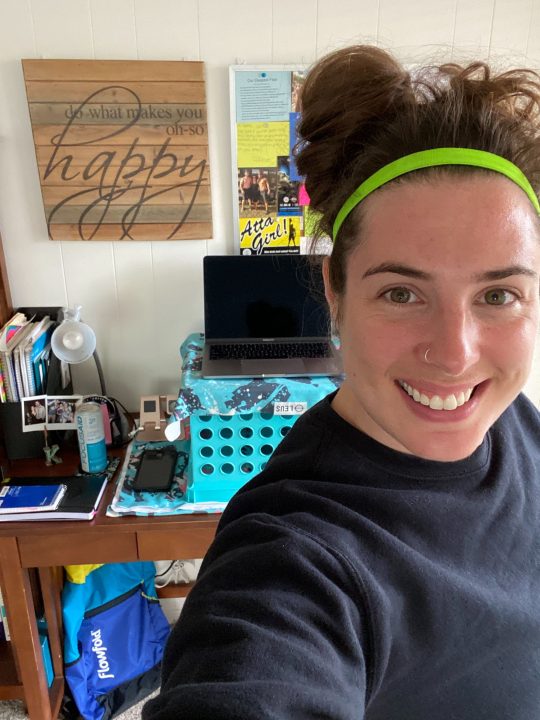 Katie, in her home office
Katie, in her home office
Orion (CEO and co-founder)
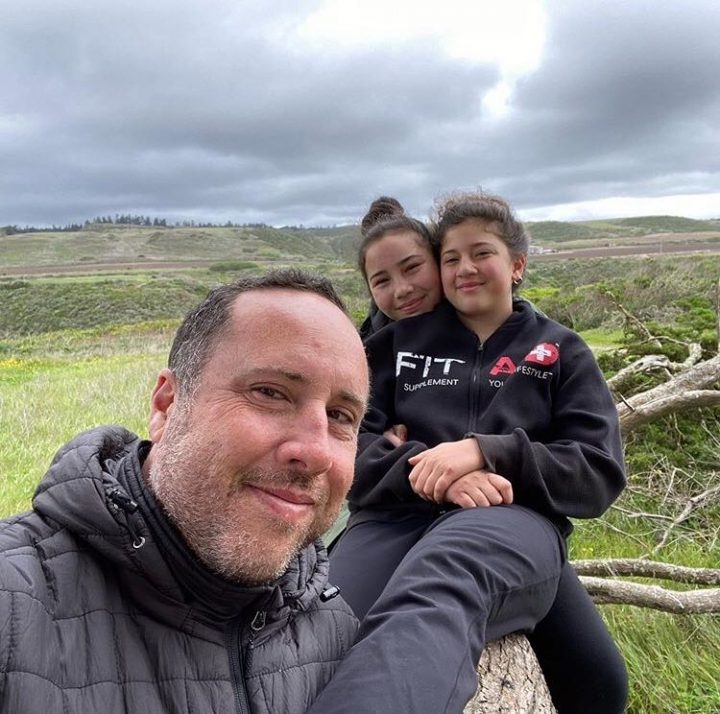 Orion & daughters in Santa Cruz
Orion & daughters in Santa Cruz
The biggest blessing for me during this crazy time of uncertainty has been how much quality time I get to spend with my two beautiful daughters. It's a perfect reminder to us all—never take these moments for granted, they are just waiting to shine through amidst all the chaos.
—Orion Melehan, LIFEAID CEO and co-founder
Need another good excuse to move your body?
LISTEN & DANCE TO DJ ORION'S HOUSE ARREST MIX HERE!
> > > Stay healthy.
